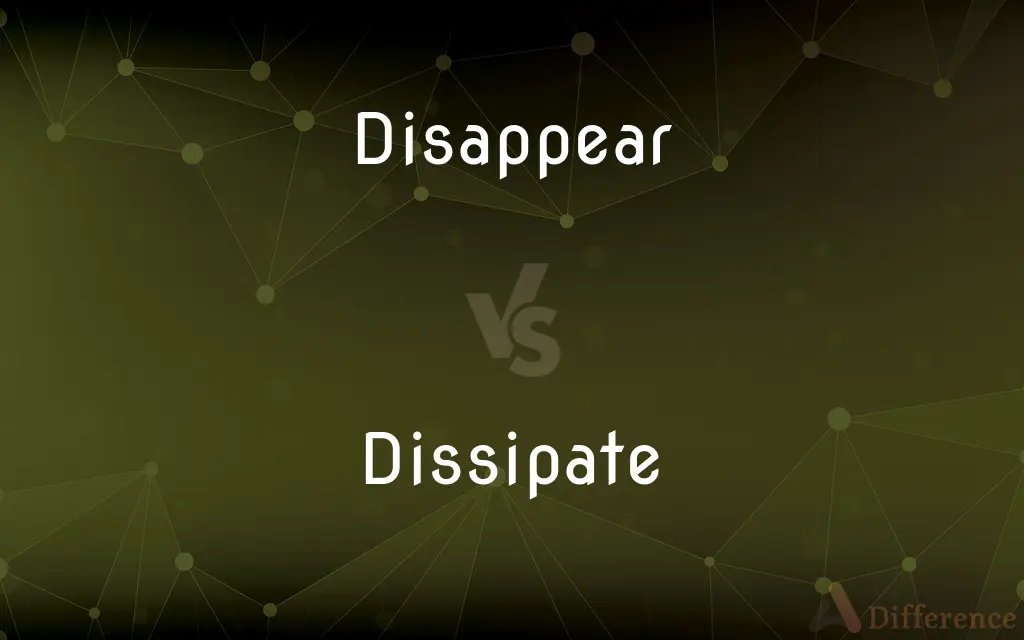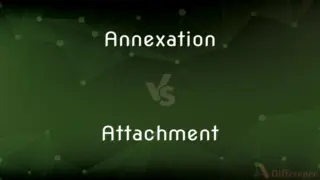Disappear vs. Dissipate — What's the Difference?
By Tayyaba Rehman & Maham Liaqat — Updated on May 2, 2024
Disappear refers to something vanishing or no longer being visible, often without a trace; dissipate involves a gradual fading or dispersion, particularly of energy, heat, or matter.

Difference Between Disappear and Dissipate
Table of Contents
ADVERTISEMENT
Key Differences
Disappear often implies that something or someone has gone out of sight or ceased to exist in a particular place, often suddenly or mysteriously. In contrast, dissipate suggests a process where elements or qualities spread out and thin out, eventually vanishing, typically in a more gradual manner.
While disappear can be used in various contexts, from physical objects to abstract concepts (like hope or feelings), dissipate is more commonly used in scientific and technical contexts, describing the scattering of energy, heat, sound, or particles.
When something disappears, it leaves behind a sense of absence or loss, as in a person disappearing from a location or an item disappearing from a room. On the other hand, when something dissipates, it suggests a decrease or dilution until it becomes negligible or disappears, such as fog dissipating with the rising sun.
Disappear can invoke a broader and sometimes more dramatic context, such as in narratives of magic or crime where things or people vanish without explanation. Dissipate, however, carries a connotation of reduction or dispersion to the point of disappearance, often used to describe fading emotions or energy.
Addressing disappearance might involve search and discovery efforts or questioning what happened to the missing entity. Addressing dissipation might focus on understanding the processes of energy transfer or the dispersal patterns of a substance.
ADVERTISEMENT
Comparison Chart
Definition
Cease to be visible or to exist in a particular place.
Scatter or disperse gradually.
Usage Context
Broad, including physical, emotional, and abstract contexts.
Often scientific, relating to energy, heat, or particles.
Connotation
Often sudden and mysterious.
Gradual and involving a decrease or dilution.
Example Processes
Vanishing, being hidden, getting lost.
Thinning out, spreading out, fading away.
Typical Associations
People, objects, feelings.
Heat, fog, sound, emotions.
Compare with Definitions
Disappear
To cease to be visible.
The ship disappeared over the horizon.
Dissipate
To spend or use wastefully.
He dissipated his entire fortune on gambling.
Disappear
To cease to exist or be in use.
The old tradition has completely disappeared.
Dissipate
To lose intensity or strength; diminish.
His anger dissipated after a few hours.
Disappear
To vanish or go missing.
His keys have disappeared again.
Dissipate
To cause to disappear by dispersal.
The wind dissipated the fog quickly.
Disappear
To be removed from consideration or memory.
All her doubts disappeared after the conversation.
Dissipate
To vanish as if by dispersion.
The echoes dissipated into the canyon.
Disappear
To withdraw from view or become inconspicuous.
She disappeared into the crowd.
Dissipate
To disperse or scatter.
The smoke dissipated into the air.
Disappear
To pass out of sight; vanish
The moon disappeared behind the clouds.
Dissipate
To break apart or attenuate to the point of disappearing
The wind finally dissipated the smoke.
Disappear
To cease to be seen; be missing or unfound
Her purse disappeared from her locker. The plane disappeared somewhere over the Pacific Ocean.
Dissipate
To drive away; cause to vanish
A discovery that dissipated his doubts.
Disappear
To cease to exist
Dinosaurs disappeared at the end of the Cretaceous Period.
Dissipate
To spend or expend intemperately or wastefully; squander
Dissipated his fortune in casinos.
Disappear
To cause (someone) to disappear, especially by kidnapping or murder.
Dissipate
To use up, especially recklessly; exhaust
Dissipated their energy.
Disappear
(intransitive) To vanish.
Dissipate
To cause to lose (energy, such as heat) irreversibly.
Disappear
(intransitive) To go missing; to become a missing person.
Eighteen years after Jaycee Dugard disappeared in 1991, she was found alive in the summer of 2009.
Dissipate
To be attenuated and vanish
The dark clouds finally dissipated.
Disappear
(intransitive) To go away; to become lost.
Dissipate
To become dispelled; vanish
His anger dissipated in time.
Disappear
(transitive) To make vanish; especially, to abduct and murder surreptitiously for political reasons.
The Chinese government is well-known for disappearing particularly-vocal political dissidents.
Dissipate
(transitive) To drive away, disperse.
Disappear
To cease to appear or to be perceived; to pass from view, gradually or suddenly; to vanish; to be no longer seen; as, darkness disappears at the approach of light; a ship disappears as she sails from port.
Dissipate
(transitive) To use up or waste; squander.
Disappear
To cease to be or exist; as, the epidemic has disappeared.
Dissipate
(intransitive) To vanish by dispersion.
Disappear
Get lost, especially without warning or explanation;
He disappeared without a trace
Dissipate
(physics) To cause energy to be lost through its conversion to heat.
Disappear
Become invisible or unnoticeable;
The effect vanished when day broke
Dissipate
To be dissolute in conduct.
Disappear
Cease to exist;
An entire civilization vanished
Dissipate
To scatter completely; to disperse and cause to disappear; - used esp. of the dispersion of things that can never again be collected or restored.
Dissipated those foggy mists of error.
I soon dissipated his fears.
The extreme tendency of civilization is to dissipate all intellectual energy.
Disappear
Become less intense and fade away gradually;
Her resistance melted under his charm
Dissipate
To destroy by wasteful extravagance or lavish use; to squander.
The vast wealth . . . was in three years dissipated.
Dissipate
To separate into parts and disappear; to waste away; to scatter; to disperse; to vanish; as, a fog or cloud gradually dissipates before the rays or heat of the sun; the heat of a body dissipates.
Dissipate
To be extravagant, wasteful, or dissolute in the pursuit of pleasure; to engage in dissipation.
Dissipate
To cause to separate and go in different directions;
She waved her hand and scattered the crowds
Dissipate
Move away from each other;
The crowds dispersed
The children scattered in all directions when the teacher approached
Dissipate
Spend frivolously and unwisely;
Fritter away one's inheritance
Dissipate
Live a life or pleasure, especially with respect to alcoholic consumption
Common Curiosities
Is disappearing always intentional?
Disappearing is not always intentional; it can also occur accidentally or through natural processes.
How can a company deal with disappearing customers?
A company can address disappearing customers by enhancing engagement, improving customer service, and offering value that meets their needs.
Can energy disappear or does it only dissipate?
According to the law of conservation of energy, energy does not disappear but can only change forms or dissipate.
What are common causes of dissipating heat in electronic devices?
Common causes include thermal resistance, inadequate cooling, and inefficient energy use leading to excess heat which then dissipates.
Why do some smells dissipate faster than others?
Some smells dissipate faster due to the volatility of the molecules involved, which affects how quickly they disperse in the air.
What does it mean when a feeling disappears?
When a feeling disappears, it means it fades away and is no longer perceived or experienced.
What happens to light when it dissipates?
When light dissipates, it spreads out and loses intensity, often getting absorbed or scattered by surrounding materials.
How do search teams work when someone disappears?
Search teams work by using coordinated efforts, technology, and sometimes dogs to trace and locate the missing person.
Can a business’s profits dissipate?
Yes, a business's profits can dissipate due to increased expenses, decreased revenue, or poor financial management.
Can clouds disappear or do they dissipate?
Clouds can do both, disappearing by ceasing to be visible or dissipating as their water particles spread and evaporate.
Share Your Discovery

Previous Comparison
Encryption vs. Encapsulation
Next Comparison
Annexation vs. AttachmentAuthor Spotlight
Written by
Tayyaba RehmanTayyaba Rehman is a distinguished writer, currently serving as a primary contributor to askdifference.com. As a researcher in semantics and etymology, Tayyaba's passion for the complexity of languages and their distinctions has found a perfect home on the platform. Tayyaba delves into the intricacies of language, distinguishing between commonly confused words and phrases, thereby providing clarity for readers worldwide.
Co-written by
Maham Liaqat















































